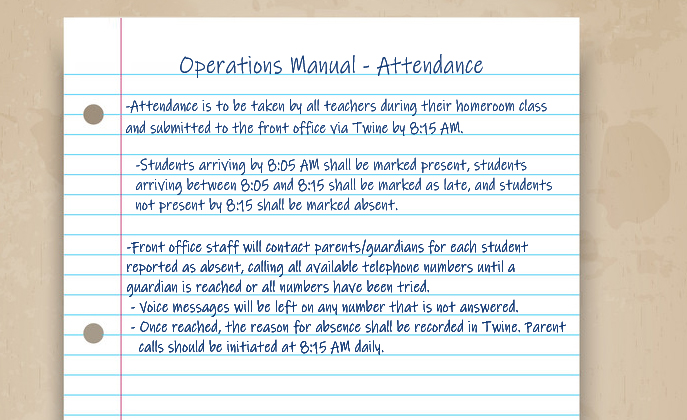Policies & Procedures
The Foundation for Smooth Sailing
The right policies & procedures will keep your school operations productive. This page outlines the policies you should consider when opening your school.
Contents
Governance for Your New School
Having documented policies and procedures - and sharing these with your students, parents and staff - is an important tool for avoiding confusion, conflicts, and even lawsuits as you run your school.
But let’s face it: nobody enjoys writing up lists of rules and regulations. So what do you need, and where can you start? We’ve pulled together some recommendations, resources and starter templates to help you construct your new school policies & procedures.
Read the Ultimate Guide to Starting a Private School
We've put together one of the most comprehensive guides to starting a private school. Ready to open your school? Read our free guide!
Every School Needs Great Software
Twine helps schools simplify their administration, automate scheduling/staffing, and lesson the load placed on teachers and administrative staff. Twine also helps with enrollment, marketing, and more. See what Twine can do:
Parent Communications
Informed parents become engaged parents and engaged parents can supercharge your school.
School Management
Twine makes it easy for teachers and administrators to do everything they need to do.
Online Classrooms
Educate, collaborate, and discuss with integrated online classrooms powered by Twine.
The Role of Bylaws, Policies, & Procedures
Bylaws, policies and procedures provide the guidelines for how your school will function. In short:
-
Bylaws are required for all private schools that are registered as non-profit entities, and define legal parameters for operation and governance.
-
Policies are rules defined by school leadership that set expectations for staff, students & parents, and provide a framework for how violations of expectations will be handled.
-
Procedures are used to codify school operations
The National Association of Independent Schools has published a great summary article on bylaws, policies, and procedures explaining the importance of each.
Policies: Setting Student & Parent Expectations
Policies: Staff Guidelines
 Ask just about any school administrator and they’ll tell you that the student/parent handbook is an important resource when it comes to making sure that everyone at the school – teachers, staff, parents, and students – are all on the same page when it comes to behavioral and academic expectations. Think of the handbook as the overarching policy book for you school: the place everyone will turn to make sure that situations are being handled fairly and that things are in order.
Ask just about any school administrator and they’ll tell you that the student/parent handbook is an important resource when it comes to making sure that everyone at the school – teachers, staff, parents, and students – are all on the same page when it comes to behavioral and academic expectations. Think of the handbook as the overarching policy book for you school: the place everyone will turn to make sure that situations are being handled fairly and that things are in order.
School policies on allowed/prohibited items, disciplinary actions, attendance processes, academic expectations, and even expected student or parental involvement in school committees or activities should all be explained in your student/parent handbook.
All that considered, the handbook is likely to be a work-in-progress over the first few years, and will likely be revisited and revised as policies evolve over time. Some great starting points that you can work from include:
-
Education World, a resource website for educators, has an incredibly comprehensive list of things to consider for your student/parent handbook, as well as links to great handbooks from public schools that can serve as inspiration as you begin to create your own.
 Just as a student/parent handbook is important for setting expectations for your clients, a staff handbook lets your staff know what is expected of them professionally.
Just as a student/parent handbook is important for setting expectations for your clients, a staff handbook lets your staff know what is expected of them professionally.
Staff handbooks typically include human resources details such as sick leave policies, vacation day accrual, payroll processing, insurance benefits, performance evaluations, and other terms of employement. In addition, a staff handbook is an ideal place to emphasize your core values, set expectations for how you want staff to interact with parents & students, provide standards for staff dress / appearance, outline expectations for coaching or extra-classroom activities, etc.
Because your staff handbook addresses human resources policy, It is strongly recommended that your staff handbook be reviewed by an attorney to ensure your policies and language are in keeping with relevant laws.
As a starting point, a general-purpose sample employee handbook has been published by 501 commons, an organization that supports nonprofits in the US. You can find additional examples of school-specific handbooks with a quick search on the web for “private school employee handbook” or similar terms to see some of the school-specific guidelines that are sometimes included.
Procedures: Consistent Processes for Running Your School
Operations Manuals
 Running a school professionally - like running any other business - depends on hundreds of small tasks happening daily by a team of staff, all of whom are in agreement on how those tasks should be accomplished.
Running a school professionally - like running any other business - depends on hundreds of small tasks happening daily by a team of staff, all of whom are in agreement on how those tasks should be accomplished.
As just one relatively simple example, think about what you’d like to happen in your school for daily attendance. There are a number of details that all staff need to agree upon, for example:
-
Who will be responsible for taking attendance? Will individual classroom teachers take attendance, or will there be a staff member taking attendance during student drop-off?
-
When is attendance to be taken, and at what time is attendance reported to the front office? Will teachers take attendance once, at the start of day, or every class period? If school starts at 8AM, do students get a few minutes of leeway before being counted as absent or late?
-
How is attendance to be recorded and reported? Will you use an attendance system such as Twine, or a shared Google document, or perhaps paper?
-
When attendance is reported to the front office, what happens? Are parents called/notified? If a parent can’t be reached at their primary number, is it acceptable to leave a message, or should additional numbers/contacts be tried?
These are likely simple decisions for you, as the school owner, to make and communicate to staff. But what happens when a substitute teacher steps in, or a front-office staff member is out and a parent volunteer is helping with attendance?
An operations manual is simply documentation of how you’d like things to be done. Regarding attendance, you might simply note:
Having put this process in writing, you now have clear instructions that can be shared with new staff and temporary staff, or referred back to if there are questions about how to handle attendance.
Generating Your Operations Manual

The challenge with operations manuals is twofold: First, documenting every process or procedure for your school can quickly become overwhelming if you try to sit down and write everything out all at once. Second, processes can and will change over time, so manuals are never truly finished and will be continually updated.
We have several recommendations to overcome these challenges:
-
Keep it simple - Operations manuals for schools can get complex, with statements of objectives, background, and research in addition to school policies and processes. Over time your manual might evolve to include these details, but to start simply document the essentials of what, when and how you want things to be done.
-
Build over time as needed - It would be impossible to predict every process you might need in advance. But there will be times when you are doing planning, or times when you come up with a solution to a question that has been posed. Those are the times to update & add to your operations manual.
-
Enlist help - There is no reason you should be solely responsible for documenting school processes. Ask staff to write down the steps for the things they do.
-
Write and publish online - To be effective your operations manual must be a living document: easily accessible to all staff, and regularly updated. Rather than print a new edition once per year, share the manual online in your staff intranet, where changes and additions can be easily noted and shared.
Software That Simplifies & Empowers Your School
Attract students, satisfy parents, and grow your school! With Twine, we keep the administration easy so you can focus on other things.
Guide Quick-Nav

Introduction
We’ve developed these 10 topics to help you along the way. Take them all in at once, or start with the areas most relevant right now.

School Identity
There’s plenty you can do to develop your own brand, starting right from your personal ideals and goals for your school.

Curriculum
Our curriculum pages include ideas on where to go to find materials, and different associations and educational models you may want to consider.

Legal & Operating Requirements
You need to know the requirements at both the federal level and for your state. Here are the basic details for every state.

Funding & Finance
Here we share ideas for possible funding sources, and ways you might be able to start with less than you thought necessary.

Business Plan & Budget
Having a plan for how you’ll operate and a budget to predict and allocate funds is critical for all businesses, schools included. We’ve pulled together resources here to help with both.

Facilities
What facilities are right for your school? We encourage new schools to get creative, and have compiled some considerations to take into account.

Staffing
How can you find and recruit the right talent for your school? What qualifications or certifications are required?

Policies & Procedures
Thinking about more than just a student handbook and conduct code, we've included recommendations & templates to help you develop your school policies & procedures

Marketing & Online Presence
Having a plan for how you’ll operate and a budget to predict and allocate funds is critical for all businesses, schools included. We’ve pulled together resources here to help with both.

Associations
What facilities are right for your school? We encourage new schools to get creative, and have compiled some considerations to take into account.
